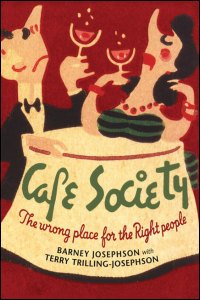

Barney Josephson's salty, wide-ranging and charming memoir shows that he lived every minute of that scenario after he opened Cafe Society in 1938 in New York's Greenwich Village. The artsy bohemian basement he created with the help of leading graphic artists and illustrators was unique in the city; and the fresh talent he showcased was stellar. The combination made good copy, and Josephson was the beneficiary of what every new club prays for: a deluge of favorable publicity.
Josephson was a firm believer in the art of presentation. He took his stars to Bergdorf-Goodman to shop; when the staff, seeing an older white man buying clothes for gorgeous black women, "would come out with their leftover gowns from four years ago, [and he would say] 'Don't bring me any of those postmortems, I want now.'" He knew about "hot."
The lineup of talent he discovered and presented (Billie Holiday, Jack Gilford, Hazel Scott, Lena Horne, Zero Mostel and Josh White, among others) is so astonishingly hot that it makes you want to rush into the street and flag down a time-traveling taxi to take you to either the venue in Greenwich Village or its larger satellite Cafe Society Uptown.
For all the glory, there were many ugly moments--racism was rampant and anti-Semitism was everywhere. Not every headliner was a hit, either. Josephson no sooner hired Carol Channing than he had to fire her (he didn't like her material); he offered a young Sarah Vaughan her first solo gig, only to find that his audience didn't connect with her early style. Audience resistance, though, was nothing compared to the red-baiting and blacklisting that accompanied the House Un-American Activities Committee after World War II.
Like so many others, Josephson found himself smeared by guilt-by-association (his brother Leon refused to testify at HUAC hearings). "One moment I'm the darling of the press, the next I'm Mr. Anathema," he writes about the drying up of press coverage for his clubs. When he had to close them in 1947 and 1949, a great era in jazz, nightlife and advances for black entertainers came to a sad end. But Josephson was not a man to collapse in a heap, and other successful adventures--musical, culinary and political--lay ahead.--John McFarland
Shelf Talker: The reminiscences (and captivating photographs) in Cafe Society testify to the key place Barney Josephson occupies in our cultural history and lend this memoir remarkable depth and charm.

